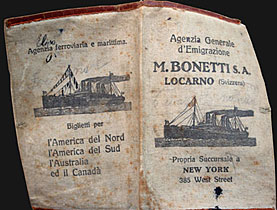
When Swiss Italians migrated en masse

swissinfo has launched an interactive, multimedia special aimed at people whose ancestors left Italian-speaking Switzerland for a better life abroad.
The second half of the 19th century and beginning of the 20th was a period of great upheaval as millions of Europeans migrated to North and South America and Australia. Italian-speaking regions of Switzerland were profoundly affected.
“We shall not stay long” includes background texts, interviews with experts and multimedia reports investigating the conditions that led to the migrations, the eventual journey into the unknown for tens of thousands and the world these “emigranti” would eventually find.
Interactive elements include a blog, picture upload, and genealogical database and are designed to bring together people with a common heritage – regardless of what part of the world they now live in.
Anyone interested in migration issues, or who may have a story to tell about their own ancestors, is invited to participate in the blog. A pre-eminent expert on the migrations to Australia and California and a genealogist will also post regularly, as will swissinfo journalists during visits they will make to the places the emigranti settled in – Australia, California and London.
When the project was initiated nearly a year ago, swissinfo sought out people with Swiss-Italian ancestry to find out what they wanted to know about the migrations.
Their answers provided the foundation for “We shall not stay long”.
I would like to know…
“I would like to know how Ticino was first settled?” asked one woman from California. “Why isn’t it part of Italy?”
“Due to the language barrier we have not learnt much about Ticino’s history,” stated another respondent. “Who do the Ticinese people identify with, the Swiss or Italians?”
“I would like to know how to contact persons for genealogy purposes,” was among the many questions swissinfo received, mostly from readers in the United States, Australia and Britain.
The queries were diverse, focussing on the socio-economic conditions that prompted the migrations and on the impact of the mass departure. “As the region lost so many of its young male workforce in the 1850s, how did it provide labour to work the farms?”
Other questions related to the region’s culture – both then and now. One requested any information at all: “Trying to get answers from Ticino has me baffled. I hope what you are doing will make this easier for me.”
Many respondents who have paid visits to the land of their ancestors recounted their first impressions.
Great aunt was witch
“I would spend hours swatting flies with the fly swat that every house seemed to have, whilst the adults conversed endlessly,” Adrian Cerroti of Australia wrote, recalling holidays in Castaneda, Graubünden as a child in the 1970s. “Families kept cattle under their houses, and a great aunt cooked with a big black pot on an open wood fire. I was convinced she was a witch.”
David McCabe of Britain had the fortune of finding traces of the family of his forefather, Joseph Bustelli, who was lured by the gold rush to Australia in 1854. “We met an elderly lady, Caterina Bustelli who directed us to the village of Intragna where she said the Bustellis had lived for generations. As we ate lunch in the local restaurant I asked in Italian where was the “casa Bustelli”? We were in it, it was now the restaurant!”
Linda Lancaster’s childhood in the US was spiced by tales her grandmother told of Ticino. “She told a story about a man high in the mountains who encountered a mountain goat that he took to be his deceased wife. I can’t remember the story, but it was very funny as she described him trying to talk to it as though it were his wife while the goat attacked him.”
swissinfo, Dale Bechtel

In compliance with the JTI standards
More: SWI swissinfo.ch certified by the Journalism Trust Initiative
















![The four-metre-long painting "Sonntag der Bergbauern" [Sunday of the Mountain Farmers, 1923-24/26] had to be removed by a crane from the German Chancellery in Berlin for the exhibition in Bern.](https://www.swissinfo.ch/content/wp-content/uploads/sites/13/2025/12/01_Pressebild_KirchnerxKirchner.jpg?ver=cb688ed5)















You can find an overview of ongoing debates with our journalists here . Please join us!
If you want to start a conversation about a topic raised in this article or want to report factual errors, email us at english@swissinfo.ch.